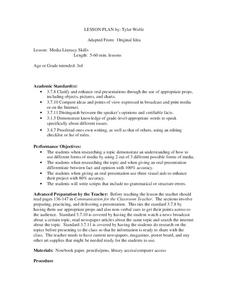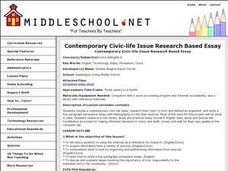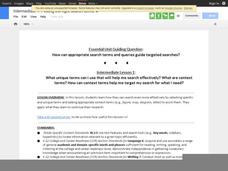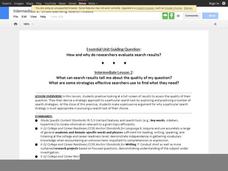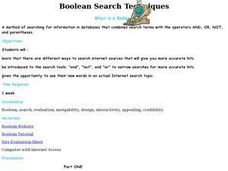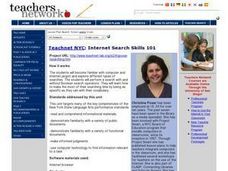Curated OER
WWW, Part 2: The URL and Search Engines
Young scholars examine the process for the creation of a home page and the use of HTML or Hypertext Markup Language. the lesson was originally written for librarians with little or no net experiences.
Curated OER
The History of Paper Money
Students research the history of paper money using the Internet in order to answer questions and create their own bills.
Curated OER
Hamlet Research Paper: Find, Evaluate, and Select Appropriate Research Sources
Help young researchers find credible sources online. Modeling with a Google search for information about Shakespeare’s Macbeth, use a computer projector or Smart Board to show class members how weak the top three search results are....
Curated OER
Source Search: Agricultural Products
Farmers just farm, right? Find out how important agricultural products are to our modern society. Learners will explore the foods, textiles, and fuels made from industrial farm goods. They'll also explore the idea of choosing an...
Curated OER
General Web Search Tools: An Introduction
Students study the three major web search tools: search engines, directories, and metasearch engines. They examine the appropriate times to use each of the search tools.
Curated OER
Reference Resources: Being a Good Detective
Students explore a variety of reference resources while seeking information. atlases, almanacs, dictionaries, encyclopedias, thesauri, and online search engines as well as library card catalogs are utilized in this lesson plan.
Curated OER
Online Scavenger Hunt
Students participate in an online scavenger hunt to answer questions posed by the teacher. In this Internet search lesson plan, students are given specific questions and they have to use the Internet to locate the answers. ...
Curated OER
Media Literacy Skills
You're on camera! Third graders find a news story and research it to get more information. Everyone uses their found information to write a script and create their own news broadcast!
Curated OER
Contemporary Civic-life Issue Research Based Essay
Seventh graders write a five paragraph persuasive essay on a contemporary civic-life issue.
Curated OER
How Can We Do Research on the Internet?
Students demonstrate how to use the Internet to research historical individuals. In this technology lesson plan, students use the "Internet Coach" CD-ROM to identify how to gather information on the Internet. Students choose an...
Google
Beginner 2: Understanding Search Results
Once you've entered effective search terms, how do you evaluate the results of your search? Through the presentation and activities included here, pupils will examine results pages and determine what guiding information is provided. By...
Google
Intermediate 1: Picking the Right Search Terms
A search can be strengthened by unique terms. With the activities and presentation included here, show your class how to target their searches with unique terms and context terms. They can then practice their search skills with...
Google
Intermediate 2: Understanding Search Results
Teach your class some strategies for effective searching. Pupils should assess the whole results screen and then determine how to go forward with their searches. A table of strategies is included, as is a challenge. After they complete...
Google
Intermediate 3: Narrowing a Search to Get the Best Results
Examine advanced filters and operators in depth. Class members try out even more filtering tools than they did in the beginning instructional activity and practice with operators, special symbols or words that affect search results,...
K20 LEARN
Unlocking Answers: Keys to Great Research
Successful searches for information require more than just a device with Google access. Young researchers learn how to use keywords and hashtags, as well as how to evaluate sources and how to paraphrase without plagiarizing in a fun...
Curated OER
In Search of Shakespeare . Images of Othello: A Shakespearean WebQuest | PBS
Students look closely at the text of "Othello." They use an online dictionary, and use various search engines. Students use an online Shakespeare concordance and make intelligent decisions about character. They write an intelligent...
Curated OER
Scouting Civil War Sites
Students evaluate websites after gathering information from various search engines. In this Civil War lesson, students browse the web and find strategies for rating websites. Students choose the best sites in their opinion...
Curated OER
Online Search Techniques: 6 Keys to Success
Students examine Boolean operators, truncation, exact phrase searching to retrieve information from search engines. They discover how using limits enhances their searches.
Curated OER
Creating an Effective Search Statement
Students identify how to turn a topic statement or research question into an effective search statement for use with electronic databases or web search engines. They apply use of Boolean operators in the searches.
Curated OER
Exploring the Smithsonian
Students explore the Smithsonian Institute. In this technology and history lesson, students work in pairs to complete a worksheet by researching questions using the Smithsonian Institute website.
Curated OER
Boolean Search Techniques
Students search using the Boolean search model. In this navigating the Internet lesson plan, students narrow their searches using and, or ,not and parentheses. Students recognize the differences in a one word search and one...
Curated OER
Internet Search Skills 101
Students practice computer and Internet jargon and explore different types of searches. They perform a search with and without Boolean search operators. In addition, they practice how to make the most of their searching time by being as...
Curated OER
Writing A Business Letter Who, What, and Where Are They
Seventh graders word process business letters using proper tab settings, spell checking, grammar and punctuation. They use the Internet to search for names and addresses.
California Department of Education
Evaluating Web Sites
If it's on the Internet, it must be true—right? How can someone tell if a website contains less-than-truthful information? Savvy surfers evaluate sources in the fifth of a six-part college and career readiness instructional activity...









